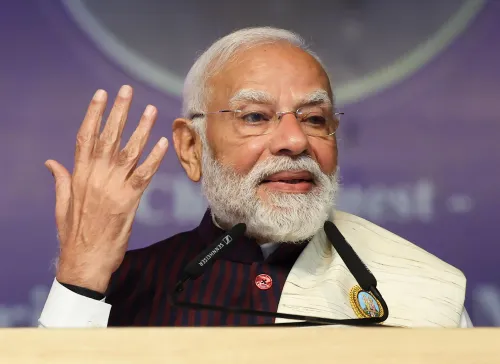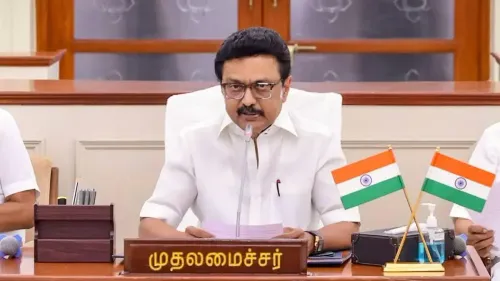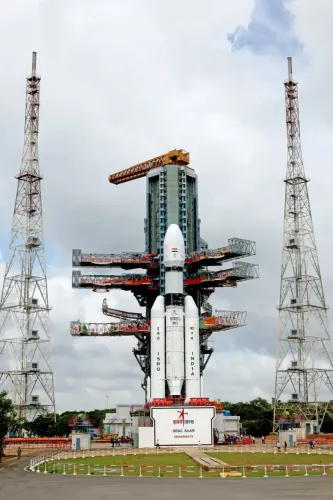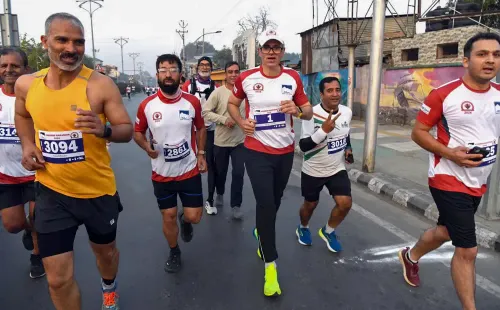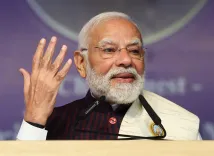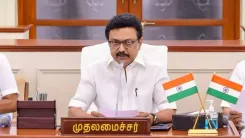Can Maharashtra Convince the Finance Commission to Raise Tax Revenue Devolution to 50%?
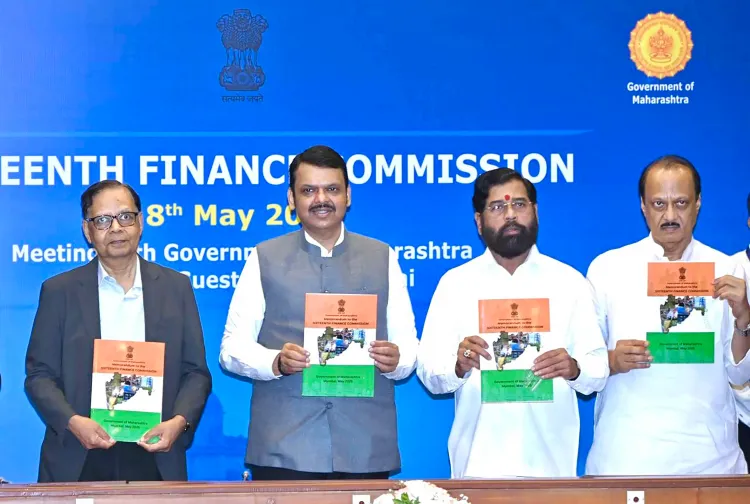
Synopsis
Key Takeaways
- Maharashtra seeks to increase tax revenue devolution from 41% to 50%.
- The state aims for a $1 trillion economy by 2030.
- Special assistance of Rs 1,28,231 crore is requested for various projects.
- Focus on sustainable development and green energy initiatives.
- Strategic fiscal support is deemed essential for national growth.
Mumbai, May 8 (NationPress) The government of Maharashtra made a compelling argument before the 16th Finance Commission, headed by Arvind Panagariya, advocating for an increase in tax revenue devolution from 41 percent to 50 percent of the divisible pool.
The Maharashtra government has also requested the amalgamation of cesses and surcharges with the main taxes and the inclusion of non-tax revenue in the divisible pool. Furthermore, the state has sought special assistance worth Rs 1,28,231 crore, which consists of a package and grants aimed at facilitating the state’s growth and achieving its ambitious goal of a $1 trillion economy.
Chief Minister Devendra Fadnavis, along with Deputy Chief Ministers Eknath Shinde and Ajit Pawar, Minister of State for Finance Ashish Jaiswal, and key bureaucrats led by acting Chief Secretary Rajesh Kumar, engaged with the 16th Finance Commission to argue that prosperous states like Maharashtra deserve a larger share from the divisible pool.
This aligns with similar demands made by Gujarat, Haryana, Telangana, Karnataka, and Tamil Nadu.
Between 2012-22 and 2025-26, Maharashtra has been allocated 6.31 percent of the 41 percent central net tax to states. The budget estimates for 2024-25 were Rs 76,931.96 crore, with revised estimates at Rs 81,163.34 crore.
According to the budget forecast for 2025-26, the state is projected to receive Rs 89,726.30 crore. From 2025-26 to 2029-30, the state anticipates receiving Rs 1.20 lakh crore annually.
Panagariya, accompanied by Manoj Panda (member), Soumya Kanti Ghosh (part-time member), and Ritvik Pandey (secretary), stated, “Maharashtra’s requests are reasonable and will be taken into account when the Finance Commission submits its report by May 31 this year. Maharashtra is among the few states that operate conservatively. Its tax-to-GDP ratio is 20 percent lower than the state average. Many states have a tax-to-GDP ratio of 30 percent. The state’s fiscal deficit is below 3 percent of the gross state domestic product, with a provision for an additional half percent under certain conditions.”
He elaborated that during horizontal devolution, the state government proposed 10 percent weightage for the rural population, 10 percent for the urban population (as per the 2011 census), 15 percent for area, 10 percent for forest cover and ecology, and a new criterion for sustainable development and green energy with 2.5 percent weightage.
The government has also recommended reducing the weightage for income distance to 37.5 percent from the current 45 percent. It proposes 10 percent weightage for demographic performance (total fertility rate), 2.5 percent for the state’s incremental contribution to India’s GDP, and 2.5 percent for tax effort.
Panagariya mentioned that the state government has requested special assistance of Rs 1,28,231 crore, which includes a special package of Rs 1,17,051 crore for the development of the Mumbai Metropolitan Region economic master plan (Rs 50,000 crore) and river linking projects (Rs 67,051 crore).
The government has also sought special grants totaling Rs 11,180 crore, which includes funding for a new Bombay High Court complex (Rs 3,750 crore), enhancing prison infrastructure (Rs 6,500 crore), support for postgraduate medical students (Rs 800 crore), and promoting eco-tourism in Vidarbha (Rs 130 crore).
In its memorandum, the state government stated: “We request the support of the 16th Finance Commission for a larger share in the transfer of Central funds, including both devolution and grants-in-aid to help the state ignite new growth engines for achieving a desired economic growth rate. We firmly believe that aiding states capable of propelling the Indian economy on a higher growth trajectory will help expand the size of the devolution cake, making more funds available to everyone, including less developed states.”
The government contended that Maharashtra is on the threshold of economic transformation, with the completion of groundbreaking infrastructure projects like the Mumbai Trans Harbour Link, Mumbai Coastal Road phase I, and Samruddhi Mahamarg, along with a series of ambitious infrastructure projects in various stages, including the Navi Mumbai International Airport, Mumbai Coastal Road, and Metro projects in Mumbai, Pune, and Nagpur, Vadhavan Port, Pune ring road, Shaktipeeth expressway, and efforts to green the energy sector by 2030.
“The memorandum from Maharashtra presents a strong case for strategic and equitable fiscal support. As a fundamental component of India’s economic framework, the state’s growth trajectory has national implications. The 16th Finance Commission’s backing through enhanced devolution, grants-in-aid, special grants, and fiscal innovations is crucial not only to achieve Maharashtra’s vision of a USD 1 trillion economy by 2030 but also to further the national objective of a Viksit Bharat by 2047,” concluded the state government.

